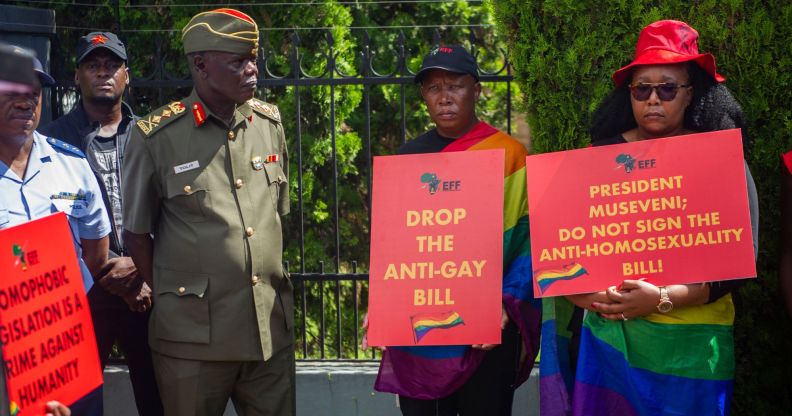US postpones Uganda meeting on HIV protection scheme after anti-LGBTQ+ bill passes

Uganda lawmakers passed the anti-LGBTQ+ bill in March, and now the US has postponed a HIV/AIDS meeting in the East African nation. (Getty)
US officials have postponed a meeting on setting up a HIV protection scheme in Uganda to assess the damage that the country’s anti-LGBTQ+ bill will have on the program.
A US State Department spokesperson told Uganda officials on Tuesday (25 April) that it needed time to consider the ramifications of the bill before it could continue talks on the US president’s Emergency Plan For AIDS Relief (PEPFAR).
The scheme is an international effort launched in 2003 to help fund HIV treatment in over 50 countries, particularly in the continent of Africa, and includes a $400 million funding programme in Uganda.
But after lawmakers in the East African nation passed the draconian Anti-Homosexuality Bill on 21 March, officials have said more time is needed before meetings between the country can continue.
“We are reviewing the possibility that the AHA [Anti-Homosexuality Act], if signed, might prevent us from providing life-saving prevention, care and treatment services equitably to all Ugandans,” a spokesperson from the US State Department said.
The homophobic legislation criminalises publicly identifying as LGBTQ+ in the nation with punishments ranging up to 20 years in jail.
Additionally, those found guilty of “aggravated homosexuality” – a term that refers to rape, child sexual abuse or incest – could face the death sentence.
While the bill was passed in March, Ugandan president Yoweri Museveni sent it back to parliament because he believed the bill to be too lenient.
Chief whip Denis Hamson Obua said that the president had agreed to sign the bill if it is amended to “facilitate the reinforcement and the strengthening of some provisions in line with our best practices”.
Officials in charge of PEPFAR voiced concerns about the stability of the programme after the anti-LGBTQ+ bill gained popularity earlier this year.
According to research collected by the State Department, men who have sex with men are five times more likely to be infected with HIV if laws that prevent homosexuality are passed.
The level of HIV prevalence reportedly increased twelvefold if countries begin prosecuting LGBTQ+ individuals.
Uganda police officers have already begun arresting men in the country for being gay, despite the law not being passed yet.
Six men aged between 20 and 26 were detained in the city of Jinja after a 17-second video of them engaging in sexual activity was seen on social media.
The men were denied bail after appearing in court on 18 April, with a judge saying they need to be detained for their own safety.
Following a tour across Africa, US Vice-President Kamala Harris states that she feels “very strongly” about supporting LGBTQ+ citizens in African countries.
“I will also say this is an issue that we consider, and I consider, to be a human rights issue and that will not change,” she said.
“A great deal of work in my career has been to human rights issues and equality issues across the board including, as it relates, to the LGBTQ+ community.
“I feel very strongly about supporting freedom and supporting and fighting for the equality of all people.“

